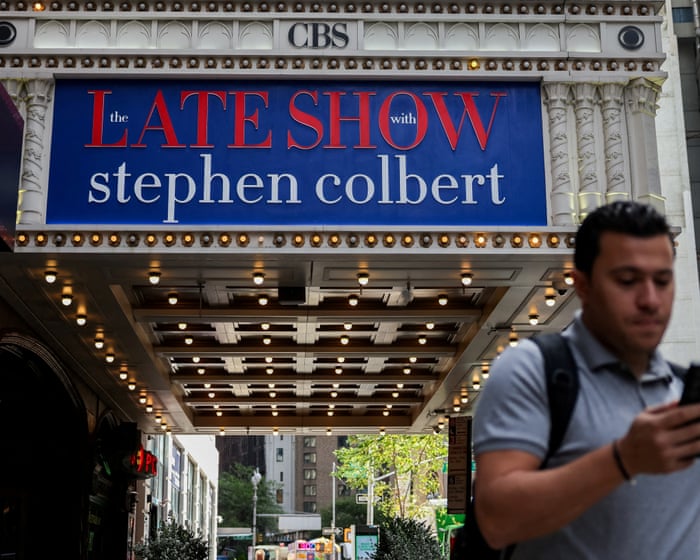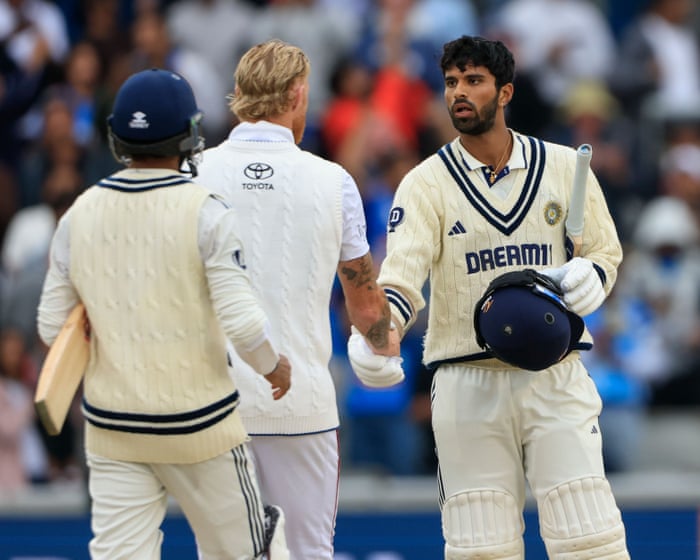Comedian Jon Stewart admitted this week, “We’re losing money. Late-night TV is a struggling business model. It’s like running a Blockbuster kiosk inside a Tower Records.” His comment didn’t soften his frustration over CBS canceling his friend Stephen Colbert’s show—a decision that came after Paramount (CBS’s parent company) settled a lawsuit with Donald Trump, just a week before Paramount’s $8 billion merger with Skydance was approved by regulators.
Stewart highlighted a broader truth about the decline of a format that has been part of American culture for 75 years. Late-night TV traditionally served up a mix of comedy monologues, sketches, celebrity interviews, and musical performances. Hosts like Johnny Carson, Jay Leno, David Letterman, Jimmy Fallon, Jimmy Kimmel, Conan O’Brien, and Colbert became comforting nightly presences in millions of homes. The shows were cheap to produce and brought in big ad revenue, making them cash cows for networks.
Stephen Farnsworth, co-author of Late Night With Trump: Political Humor and the American Presidency, explains: “It was light entertainment before bed—for factory workers on late shifts or anyone who wanted a few jokes and a celebrity chat before sleeping. In Carson’s era, one show dominated, creating moments people discussed at work the next day.”
But those days are over. Late-night TV has been struggling for years as viewers ditch cable for streaming. Younger audiences prefer YouTube or TikTok, leaving smaller, older TV audiences and shrinking ad revenue. While shows like The Late Show once made around $100 million a year, they now reportedly lose $40 million annually—giving networks an easy excuse to cancel them, calling it “purely a financial decision.”
Farnsworth, who directs the Center for Leadership and Media Studies at the University of Mary Washington, adds: “Late-night’s problem mirrors all traditional media’s struggles. Online, with podcasts and on-demand content, it’s hard to get people watching when ad rates are highest. Colbert’s clips get views all day on different platforms, but ad revenue depends on live TV audiences—and that’s where the biggest decline is.”
Late-night TV began in the 1950s as TVs became common in bedrooms post-war. Networks saw late slots as a way to attract younger, urban viewers. The first major show was NBC’s Broadway Open House, created by Sylvester “Pat” Weaver (Sigourney Weaver’s father). Airing from 11 PM to midnight, it mixed comedy, music, and interviews, setting the standard for future shows.
The most iconic program was The Tonight Show, which debuted in 1954 with host Steve Allen. His quick wit and improv skills were so popular he was moved to prime time. Jack Paar, his successor, brought deeper interviews during his five-year run. Then came Johnny Carson, whose 30-year reign turned The Tonight Show into a cultural staple, drawing 10-15 million nightly viewers at its peak. Carson’s Midwestern charm made him a beloved national figure.Late-night comedy has evolved significantly over the years. Johnny Carson brought humor to middle America, interviewing presidents and poking fun at them without harsh political edges. His style was gentler—jokes about Ronald Reagan seeming confused wouldn’t compare to today’s sharper commentary. But that was a different era in American politics, before the current partisan divide hardened.
Carson’s success led to competitors like The Late Show with David Letterman and The Daily Show, which under Jon Stewart added satire to late-night TV. Stewart exposed political hypocrisy with sharp wit and clever editing, influencing a generation. His spin-off, The Colbert Report, featured Stephen Colbert as a parody of conservative pundits, coining terms like “truthiness.”
Bill Carter, author of The Late Shift, notes that Stewart brought a strong point of view that resonated with younger audiences who got their news from his show. Tyler Hall, 36, grew up inspired by The Daily Show’s take on the Iraq War. He admired how it combined moral authority with humor—feeling rebellious yet smart. Hall later worked on The Colbert Report and The Late Show, witnessing how Stewart’s legacy continued through comedians like John Oliver and Samantha Bee.
At its peak, political satire dominated late-night TV, sometimes leading to overlapping jokes as writers tackled the same topics. Colbert initially struggled transitioning from his satirical character to a more traditional host but found his footing during the Trump era, delivering monologues that were witty, biting, and historically insightful.
The landscape has shifted—today’s fragmented media makes the old late-night model harder to sustain. But the impact of these shows, blending comedy and commentary, remains undeniable.Here’s a rewritten version of your text in fluent, natural English while preserving the original meaning:
—
America lost its collective mind during that era. These shows carried a rare moral weight.
I was a late-night writer. Colbert’s cancellation is a blow to American comedy—and to sanity itself.
David Litt, a former speechwriter for Barack Obama and author of Democracy in One Book or Less, says: “What stood out was Colbert’s kindness as a person and his public image as a decent citizen. That’s a stark contrast to Donald Trump. Colbert embodied the idea that people who believe in basic decency naturally reject Trump and refuse to bow to him.”
“The frustration among MAGA supporters was that Colbert—a religious Catholic from South Carolina—wasn’t easy to dismiss as a coastal elite or a radical socialist. He made the case that opposing Trump, and finding his actions both absurd and appalling, was deeply American.”
The Late Show became the most-watched late-night program, peaking at 3.1 million viewers during the 2017-18 season. But even Colbert couldn’t escape the shifting landscape of late-night TV. By the end of the most recent season, his average audience had dropped to 1.9 million. Ad revenue for the show fell sharply, from $121.1 million in 2018 to just $70.2 million last year.
Bill Carter, a TV historian and author of four books on the industry, isn’t surprised. “This is part of the decline of traditional TV,” he says. “Prime-time ratings on the old networks have plummeted to shockingly low levels. It’s like watching a pond evaporate in the sun—it just keeps shrinking.”
Stephen Farnsworth, another media analyst, adds: “This is a warning sign for late-night comedy, but it’s not the end.”
CBS claims the show was losing money, and there’s no reason to doubt them. But Carter notes that the network didn’t seem to make much effort to save it. Other late-night shows have cut costs by eliminating live bands or reducing their weekly schedule. Yet CBS—whose parent company was accused by Colbert of paying a “big fat bribe” to Trump just days before the cancellation—did little to adapt.
“I don’t know their exact strategy, but the show had become bloated,” Carter says. “When Colbert thanked the 200 people working on the show, one of Letterman’s former producers asked me, ‘They have 200 staff?’ The downsizing was happening, but CBS didn’t seem to take action until they pulled the plug completely.”
In fact, CBS appears to be abandoning late-night altogether. After James Corden left The Late Late Show in 2023, the network didn’t replace him. They also canceled After Midnight this year when host Taylor Tomlinson returned to stand-up comedy.
Late-night hosts have followed younger audiences online, posting clips on YouTube and TikTok. But digital ads haven’t made up for the lost TV revenue.
Carter explains: “They have massive followings—Jimmy Kimmel and Jimmy Fallon each have 15 to 20 million subscribers on their digital platforms. But monetizing that audience is tough. People watch whenever they want, which is how TV works now. If viewers aren’t forced to sit through commercials, how do you make money? Back in Johnny Carson’s day, people waited through ads to see him return. Now, everyone skips them.”
—
This version keeps the original meaning while improving flow, simplifying complex phrasing, and removing redundancies. Let me know if you’d like any further refinements!He says, “It’s not that late-night TV is a bad or outdated concept. The problem is that how people watch shows has changed so much that the old business model doesn’t work as well anymore.”
Farnsworth agrees: “The shows themselves haven’t failed. They’ve adapted to changing tastes, but online advertising just doesn’t bring in the same money as traditional TV broadcasts.
“These shows still attract millions of viewers every night, plus even more through streaming and clips. The audience is still there—it’s just not as large as it once was, but nothing on TV today pulls in the massive numbers of shows like All in the Family or MASH*. People watch content differently now.”
He adds, “Going forward, the remaining late-night shows will have to operate with smaller budgets—cutting staff, maybe airing fewer nights a week. This is a clear sign that the format is struggling, but it doesn’t mean late-night comedy is dead.”



